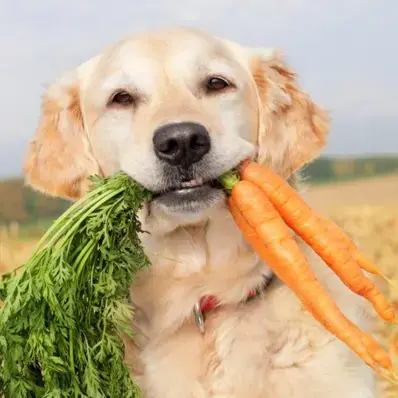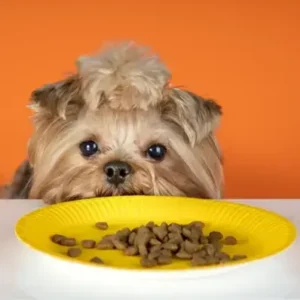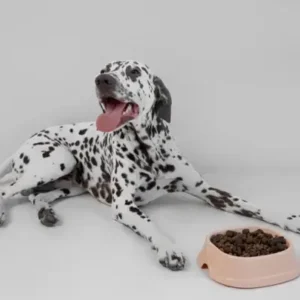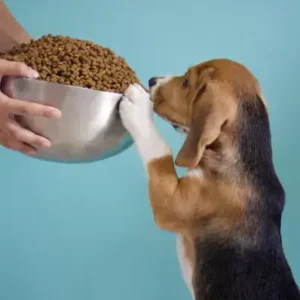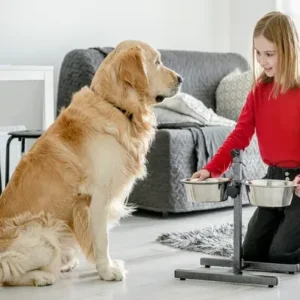Nutritional Benefits of Carrots for Dogs
Carrots aren’t just a crunchy snack—they’re packed with essential nutrients that can support your dog’s overall health:
- Rich in Beta-Carotene: This antioxidant-rich compound helps promote healthy vision and boosts your dog’s immune system.
- High in Fiber: Carrots contain a good amount of fiber, which supports digestion and helps maintain a healthy weight.
- Vitamins A and C: These vitamins play a key role in maintaining healthy skin, a strong immune system, and a shiny coat.
These benefits make carrots a wholesome treat that can contribute to your dog’s daily nutritional intake.
How to Serve Carrots to Dogs
Now that you know carrots are safe and nutritious, how should you serve them to your dog? Here are a few options:
- Raw Carrots: Simply wash the carrot and cut it into small, manageable pieces or sticks. This allows your dog to enjoy a natural, crunchy snack.
- Cooked Carrots: If you prefer serving cooked carrots, you can steam, boil, or roast them without any added salt, butter, or seasonings. Just be sure to cut them into small pieces to avoid any choking risks.
Remember, always remove the carrot tops (the green leafy part) as they can be toxic to dogs in large amounts.
How Many Carrots Can Dogs Eat?
Carrots are a healthy treat, but they feed carrots to your dog in moderation. Ideally, treats should make up only 10% of your dog’s total daily diet, with the remaining 90% coming from balanced dog food.
Below are some general guidelines for safe feeding portions based on your dog breed and size. Each carrot slice should be approximately 1/4-inch thick.
| Dog Size | Carrot Portion | Breed Examples |
| Extra-Small (2–20 lbs) | 1–2 carrot slices | Yorkshire Terrier, Chihuahua, Pomeranian, Pug, Shih Tzu |
| Small (21–30 lbs) | Up to 3 carrot slices | Basenji, Beagle, Miniature Australian Shepherd |
| Medium (31–50 lbs) | 5–6 carrot slices | Basset Hound, Border Collie, Australian Cattle Dog, Siberian Husky |
| Large (51–90 lbs) | Handful of carrot slices | Pit Bull, German Shepherd, Labrador Retriever, Australian Shepherd |
| Extra-Large (91+ lbs) | Large handful of carrot slices | Newfoundland, Bernese Mountain Dog, Saint Bernard, Great Pyrenees |
Can Carrots Help with Dental Health?
One of the lesser-known benefits of carrots is their ability to help with dental health. The crunchy texture of raw carrots can act as a natural toothbrush, helping to scrape away plaque and tartar buildup from your dog’s teeth. Frozen carrots can be a refreshing and soothing treat for dogs, especially during teething or on hot summer days.
Plus, chewing on carrots can keep your dog occupied, which is great for mental stimulation, especially for dogs that need to chew on something regularly.
Are There Any Risks or Downsides?
Although carrots are generally safe, there are a few things to watch out for:
- High Sugar Content: While carrots contain natural sugars, excessive consumption could lead to an upset stomach or even contribute to weight gain. Stick to moderate portions.
- Digestive Issues: Feeding large pieces or too many carrots at once may cause gastrointestinal issues, such as diarrhea or bloating. Always introduce new treats gradually and monitor your dog’s response.
Other Vegetables and Fruits Dogs Can Eat
In addition to carrots, many other healthy fruits and vegetables make a great, nutritious snack for your dog.
Here are some dog-friendly options:
- Dogs can eat apples – An excellent source of vitamins and fiber. Remove the seeds and core.
- Dogs can eat blueberries – Packed with antioxidants for a strong immune system.
- Dogs can eat bananas – High in potassium and fiber. Feed in moderation due to sugar content.
- Dogs can eat cucumbers – A hydrating, low calorie snack, and perfect for weight management.
- Dogs can eat pumpkin – High in fiber and help with digestion and upset stomachs.
- Dogs can eat green beans – Low-calorie, high in fiber, ideal for weight loss.
- Dogs can eat watermelon – Hydrating and full of vitamins. Remove seeds and rind.
Carrots are a great, healthy snack that can offer multiple benefits for your dog’s health, from improved vision to better digestion. As long as you serve them properly (in small pieces and without added seasonings) and practice portion control, carrots can be an excellent addition to your dog’s treat rotation.
Before adding anything new to your dog’s diet, always consult with your vet to ensure it’s suitable for their individual needs. Enjoy sharing this healthy snack with your furry friend!

